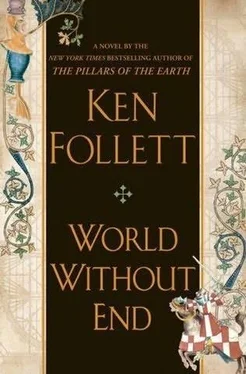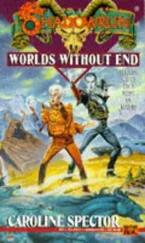“What a shame,” Godwyn said sympathetically. “I’ll ask all the monks and nuns to look out for it.”
Philemon said: “I haven’t seen it.”
Godwyn said to Philippa: “Perhaps it slipped from your wrist.”
She frowned. “The odd thing is, I haven’t actually worn it since I got here. I took it off when I arrived, and put it on the table, and now I can’t find it.”
“Perhaps it rolled into a dark corner. Philemon here will look for it. He cleans the guest rooms.”
Philippa looked at Philemon. “Yes, I saw you as I was leaving, an hour or so ago. You didn’t spot it when you swept the room?”
“I didn’t sweep. Miss Margery came in just as I was getting started.”
Godwyn said: “Philemon has just come back to clean your room, but Miss Margery is -” he looked into the room – “at prayer,” he finished. Margery was kneeling on the prie-dieu, eyes closed – begging forgiveness for her sin, Godwyn hoped. Richard stood behind her, head bowed, hands clasped, lips moving in a murmur.
Godwyn stepped aside to let Philippa enter the room. She gave her brother-in-law a suspicious look. “Hello, Richard,” she said. “It’s not like you to pray on a weekday.”
He put his finger to his lips in a shushing gesture, and pointed to Margery on the prayer stool.
Philippa said briskly: “Margery can pray as much as she likes, but this is the women’s room, and I want you out.”
Richard concealed his relief and left, closing the door on the two women.
He and Godwyn stood face to face in the hallway. Godwyn could tell that Richard did not know what line to take. He might be inclined to say: How dare you burst into a room without knocking? However, he was so badly in the wrong that he probably could not summon up the nerve to bluster. On the other hand, he could hardly beg Godwyn to keep quiet about what he had seen, for that would be to acknowledge himself in Godwyn’s power. It was a moment of painful awkwardness.
While Richard hesitated, Godwyn spoke. “No one shall hear of this from me.”
Richard looked relieved, then glanced at Philemon. “What about him?”
“Philemon wants to be a monk. He is learning the virtue of obedience.”
“I’m in your debt.”
“A man should confess his own sins, not those of others.”
“All the same, I’m grateful, Brother…?”
“Godwyn, the sacrist. I’m the nephew of Prior Anthony.” He wanted Richard to know that he was sufficiently well connected to make serious trouble. But, to take the edge off the threat, he added: “My mother was betrothed to your father, many years ago, before your father became the earl.”
“I’ve heard that story.”
Godwyn wanted to add: And your father spurned my mother, just as you’re planning to spurn the wretched Margery. But instead he said pleasantly: “We might have been brothers.”
“Yes.”
The bell rang for dinner. Relieved of their embarrassment, the three men parted company: Richard to Prior Anthony’s house, Godwyn to the monks’ refectory, and Philemon to the kitchen to help serve.
Godwyn was thoughtful as he walked through the cloisters. He was upset by the animal scene he had witnessed, but he felt he had handled it well. At the end, Richard had seemed to trust him.
In the refectory Godwyn sat next to Theodoric, a bright monk a couple of years younger than he. Theodoric had not studied at Oxford, and in consequence he looked up to Godwyn. Godwyn treated him as an equal, which flattered Theodoric. “I’ve just read something that will interest you,” Godwyn said. He summarized what he had read about the revered Prior Philip’s attitude to women in general and nuns in particular. “It’s what you’ve always said,” he finished. In fact, Theodoric had never expressed an opinion on the subject, but he always agreed when Godwyn complained about Prior Anthony’s slackness.
“Of course,” Theodoric said. He had blue eyes and fair skin, and now he flushed with excitement. “How can we have pure thoughts when we are constantly distracted by females?”
“But what can we do about it?”
“We must confront the prior.”
“In chapter, you mean,” Godwyn said, as if it were Theodoric’s idea rather than his own. “Yes, excellent plan. But would others support us?”
“The younger monks would.”
Young men probably agreed with more or less any criticism of their elders, Godwyn thought. But he also knew that many monks shared his own preference for a life in which women were absent or, at least, invisible. “If you talk to anyone between now and chapter, let me know what they say,” he said. That would encourage Theodoric to go around whipping up support.
The dinner arrived, a stew of salt fish and beans. Before Godwyn could begin to eat, he was prevented by Friar Murdo.
Friars were monks who lived among the people instead of secluding themselves in monasteries. They felt that their self-denial was more rigorous than that of institutional monks, whose vow of poverty was compromised by their splendid buildings and extensive landholdings. Traditionally friars had no property, not even churches – although many had slipped from this ideal after pious admirers gave them land and money. Those who still lived by the original principles scrounged their food and slept on kitchen floors. They preached in market places and outside taverns, and were rewarded with pennies. They did not hesitate to sponge on ordinary monks for food and lodging any time it suited their convenience. Not surprisingly, their assumption of superiority was resented.
Friar Murdo was a particularly unpleasant example: fat, dirty, greedy, often drunk, and sometimes seen in the company of prostitutes. But he was also a charismatic preacher who could hold a crowd of hundreds with his colourful, theologically dubious sermons.
Now he stood up, uninvited, and began to pray in a loud voice. “Our Father, bless this food to our foul, corrupt bodies, as full of sin as a dead dog is full of maggots…”
Murdo’s prayers were never short. Godwyn put down his spoon with a sigh.
*
There was always a reading in chapter – usually from the Rule of St Benedict, but often from the Bible, and occasionally other religious books. As the monks were taking their places on the raked stone benches around the octagonal chapter house, Godwyn sought out the young monk who was due to read today and told him, quietly but firmly, that he, Godwyn, would be reading instead. Then, when the moment came, he read the crucial page from Timothy’s Book.
He felt nervous. He had returned from Oxford a year ago, and he had been quietly talking to people about reforming the priory ever since; but, until this moment, he had not openly confronted Anthony. The prior was weak and lazy, and needed to be shocked out of his lethargy. Furthermore, St Benedict had written: “All must be called to chapter, for the Lord often reveals to a younger member what is best.” Godwyn was perfectly entitled to speak out in chapter and call for stricter compliance with monastic rules. All the same, he suddenly felt he was running a risk, and wished he had taken longer to think about his tactics in using Timothy’s Book.
But it was too late for regrets. He closed the book and said: “My question, to myself and my brethren, is this: Have we slipped below the standards of Prior Philip in the matter of separation between monks and females?” He had learned, in student debates, to put his argument in the form of a question whenever he could, giving his opponent as little as possible to argue against.
The first to reply was Blind Carlus, the sub-prior, Anthony’s deputy. “Some monasteries are located far from any centre of population, on an uninhabited island, or deep in the forest, or perched on a lonely mountain top,” he said. His slow, deliberate speech made Godwyn fidget with impatience. “In such houses, the brothers seclude themselves from all contact with the secular world,” he went on unhurriedly. “Kingsbridge has never been like that. We’re in the heart of a great city, the home of seven thousand souls. We care for one of the most magnificent cathedrals in Christendom. Many of us are physicians, because St Benedict said: ‘Special care must be taken of the sick, so that in very deed they be looked after as if it were Christ himself.’ The luxury of total isolation has not been granted to us. God has given us a different mission.”
Читать дальше












